The Banner Saga‘s first chapter is due out next month. It’s certainly much anticipated, coming from a team of ex-Biowares, and following a phenomenally successful Kickstarter. A tactical RPG, turn-based combat combined with a unique way of delivering its narrative, it’s going to be interesting to see how it suits people’s tastes. It certainly divided John and Adam, as they played through the first three or four hours of the game.
John: Right, I’ve just reached the climax of the preview version of The Banner Saga, and I’m not entirely sure what happened. I was one group in the West, then another in the East, and there was some walking. What did I just do?
Adam: You led a group of giants, a few humans and a snotty prince through confusing and dangerous battles. Sometimes they were fighting men, mostly they were fighting angry people made out of pebbles. You may have noticed that the sun had frozen in the sky? That is because of lore. The group in the East fired some arrows, became refugees and panicked quite a lot. Everyone probably died more than once. Does that sound about right?
John: Seems to. I was so confused when it switched to the weaklings in the East, with no warning, or mention of who anyone was. I really felt like I’d arrived mid-story. Was that my being stupid, or was that the game not having that info in yet?
Adam: I don’t know how intentional it is. There’s an enormous amount of history already in there – the map is like a miniature Lonely Planet guide to the world – but nothing is explained directly. The very first fight is against some humans in a great hall, with other people watching on in a seemingly relaxed manner. I didn’t know why my units were giants with horns, or why they were killing some of the people and not others. I didn’t know where they were going or why, but by the end of the three hours or so, things were starting to make sense.
John: Yeah, I figured they were the baddies. I was surprised when I was playing them. Am I fair in saying this is the first on-rails RPG?
Adam: I felt like I was being held at arm’s length at first, and I’m still not convinced by the sudden switch to the East, but I appreciated the slow-build by the end. Like a slightly clogged drip feed.
It feels a little like Fire Emblem. Tactical turn-based combat interspersed with journeying, conversation and levelling up. That’s the closest comparison I can think of. And with perma-death too, although not in combat. Units that fall in combat are injured for a while, with reduced stats, but during the journey itself, decisions can kill characters.
John: And entirely reshape your army. But an army you really have no consciousness of.
Adam: Yeah. During travel the composition of the group is listed at the top of the screen – peasants, warriors and Varl (the giants) – and during large battles or other incidents, numbers rise and fall. And there are supplies as well, to keep everyone fed and fit. But it does sometimes feel arbitrary – I collected loads of supplies, never had to worry about them, and then lost most of them due to one poor decision. The supply numbers, in particular, seem more suited to a journey with more player agency. If you could choose to take long routes through barren land or fertile ground with many enemies and space for ambushes, it’d make more sense to monitor that and make decisions that felt like they had weight.
John: I felt like I had no agency at all. Which was the strangest part of this. I felt like I was being dragged from fight to fight, asked questions I didn’t understand that had an impact I wasn’t able to measure.
And that wasn’t helped by my having no idea who
I was throughout. Characters appear and disappear, and the way conversations are displayed makes it furiously difficult to work out who’s saying what to whom.
Adam: The most confusing part of the conversations is being referred to as ‘you’. It took me a while to realise who ‘I’ was. And then it changed! IDENTITY CRISIS. I thought I was the scribe at first, which made a certain kind of sense – a character not directly involved in combat and therefore unable to perish. But then I realised I was a giant with an axe.
John: I was certain I was the scribe. Now I’ve no idea who I was.
Adam: You are a casualty of war. All of that said, I appreciate the lack of lengthy exposition. To an extent. It’d be helpful to have a brief primer though.
John: Okay, so the fights. I’m not the best at turn-based tactics, obviously. But I found them extremely difficult.
Adam: They are. And I think that’s partly because everything is so easy at first. Walk here, hit the man, the man falls down. Everybody is happy. And suddenly the distinction between armour and health becomes extremely important – which to target when and which character to use – and special abilities are absolutely necessary. I cracked it, but it took a while. And there were moments of frustration, when I thought I’d have to give up.
John: I’m certain I’m doing everything available. Firing of special moves early and until I run out of juice, chipping at armour before going for health, and making sure Varl are in the front lines. But I still only take 2 armour off an enemy who then thwacks me for 9, and am massively overpowered in every situation.
And with the fighters in the West, I’ve not been given a chance to buy items at any point I can recall, and prevented from resting between big fights, and too often not given chances to level up my characters. It feels really strangely restrictive. The screens offering me a choice of whom to take into battle are pretty meaningless. Um, everyone, obviously. And then there’s no freedom, no option to use an archer, or rebalance my tanks, etc.
Adam: It’s punishing, no doubt about it. Any attack that can create separation, pushing enemies back or grouping them together for knock-on effects, works wonders. There are chain reactions that chip away at a whole group. I tended to have a couple of varls hang back and only plod into battle when armour was already depleted. And sometimes that meant sacrificing another character to an early injury – a sort of kamikaze attack.
Agreed on the restrictiveness though. Squad selection is meaningless – presumably that changes later in the game, perhaps when the two groups meet? And there aren’t enough chances to shop or level up. It doesn’t help that there are SO many different classes, all with one special ability. And mostly unique to a single character, at this point.
BUT I LIKE IT!
John: See, I don’t!
Adam: Pistols at dawn!
John: Tell me why you like it. Explain why a game that doesn’t let you really do anything between the fights, but make arbitrary decisions based on guessing, has won you over?
Adam: Here goes – I just cracked my knuckles and took a giant swig of coffee. I’m not excusing all of the restraints by saying this next part, but I think it’s important. It isn’t a game about war, at least not from the perspective of the characters we’ve seen so far on this portion of the journey (about a quarter of the game, we’re told). They are refugees, even if they don’t begin that way, attempting to escape a larger more powerful force that most of them don’t understand. The side-long shots of the party travelling have a heroic aspect to them when seen as stills, but they show a baggage train of the wounded and the weary seeking some kind of sanctuary.
Now, that doesn’t make the lack of assistance or suitable pauses for rest and customisation a perfect choice, but I think digging into the chain of events is helpful. It’s almost an anti-heroic saga at the moment, a depiction of futility. Backs against the wall stuff. But I think, even by the end when I’d lost my best units and raged against the unfairness of it all, I managed to pick my way through and felt pretty good about it. I did have a strong sense of achievement – but, admittedly, it was lessened by the lack of involvement with the characters.
John: I’m at a point now where I can’t win a fight. My guys are injured, the game won’t let me rest before the next fight, and it’s packed with ridiculously overpowered enemies. So I won’t win it, no matter how often I replay. So is that a game over? Am I done now?
Adam: This is the big problem – I haven’t ended up in that situation, even though I thought I had for a while, and I can’t see how it’s avoided. And that I do not like.
I’m not sure how the heroes are rebalanced when somebody is lost – I did seem to receive a couple of level one replacements whenever I lost anyone stronger, but I think that was by chance rather than design.
John: So presumably you’re now looking forward to the rest of the game. The other three quarters. What are you expecting from them?
Adam: There’s a fairly unsurprising but effective ending shot in the preview code, just after the tower fight. I do want to see what happens in the world they’ve created – I like the setting a lot, even if I’ve taken a while to warm to the characters. I’m actually becoming fond of the petulant prince, even though the game keeps giving me the option to beat him up and tie him to a tree.
John: I did eventually give up, knock him out, and send him home.
Adam: And I enjoy the combat, stupid difficulty spikes aside. I’m hoping that’s balanced somewhat – and just realised I don’t remember a difficulty option.
John: There is one. I played on Normal. I may try Easy.
Adam: I’d be interested to see how much those kind of decisions change things. I’m tempted to play again to see if I can keep certain people alive. Did you get the impression that some events on the road occur randomly? I did, but haven’t been able to test that.
John: Honestly, I gave up trying to follow what was going on. The story was so incomprehensible to me that everything felt random.
We should probably mention the art. It’s ludicrously beautiful.
Adam: Oh yes. Let’s do that. It looks as good as the early screenshots suggested it might.
John: It looks like something Disney might have created if Disney weren’t smug and evil.
Adam: Even the battles, which are possibly the least attractive part, have lovely touches. The death and pain animations are wonderfully detailed.
John: I love how someone will stagger, and only just stand up again.
Adam: Yeah, dropping their weapons. The prince is my favourite – when he takes a hard blow, he drops his spear, falls to his knees and scrambles to get up again. When he goes down for good, it’s almost the same, but the spear snaps in half as he raises it to defend himself.
John: It’s pretty obvious this is a team made of artists. So, say something conclusive.
Adam: I think the problems with the combat are encapsulated in the different classes – too many, with no real direction over their progression when they level up, and all tied to a specific skill. It creates detachment and the harder battles have to be approached with an eye to perfection. But I found myself sucked into the mystery of the world – it’s a beautifully strange place – and I’m willing to struggle through the hard patches.
John: I feel like The Banner Saga is someone making a tactical RPG especially for me. An emphasis on story, character ahead of stats, and a relatively simply interface. And I just didn’t enjoy it. I felt remote from it, entirely confused at every point, and never engaged. And that frustrates me, as I really wanted to.
Adam: Will you play the full version?
John: I’m put off. I can’t deny that. If someone promised me it were rebalanced, and there was some attempt to tell you who you were and why you were, I’d be interested to come back.
Adam: I do think it needs some rebalancing. Particularly, I want to know that it’s impossible to hit a dead-end. The large retinue is a perfect excuse to throw out some extra units when a player is struggling.
John: Say something final and optimistic.
Adam: It’s one of the most beautiful games I’ve played though, not just in its style but in the craft that has gone into making that a reality. It’s challenging, mysterious and not quite like anything else, and I mean that last part mostly in a positive way.























![Have Many Potato [2013] Codex 2013](/forums/smiles/campaign_tags/campaign_potato2013.png)
![The Year of Incline [2014] Codex 2014](/forums/smiles/campaign_tags/campaign_incline2014.png)

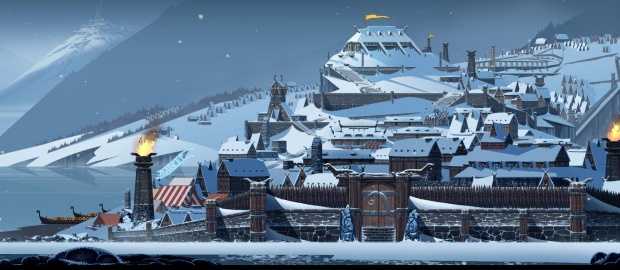
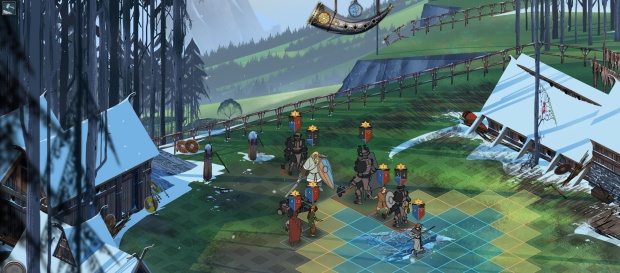
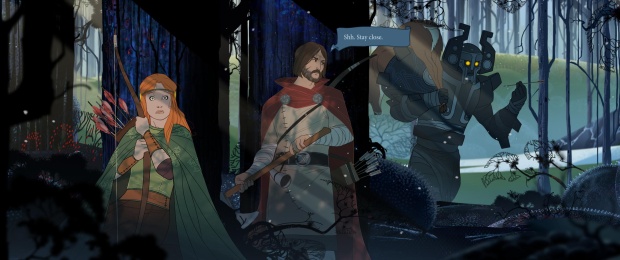
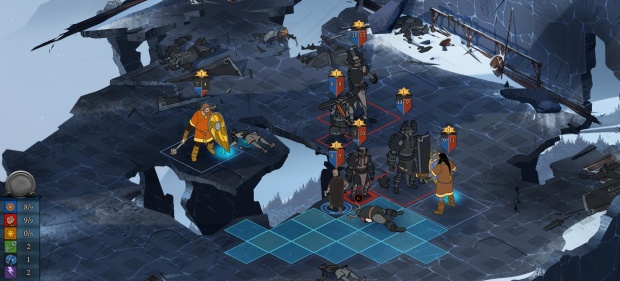
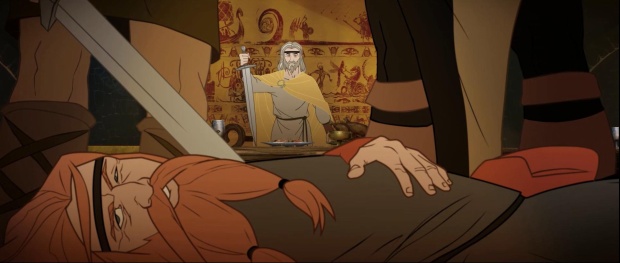




![Glory to Codexia! [2012] Codex 2012](/forums/smiles/campaign_tags/campaign_slushfund2012.png)













